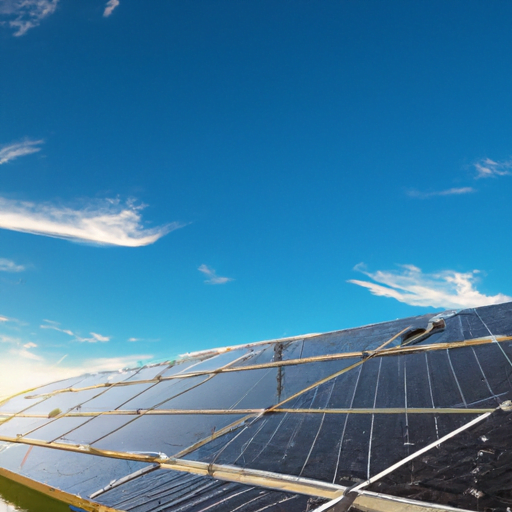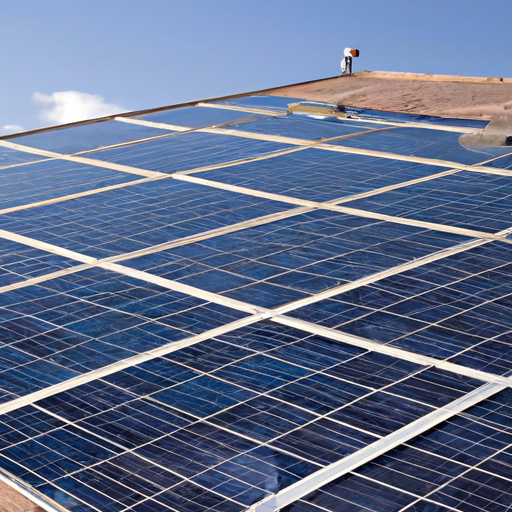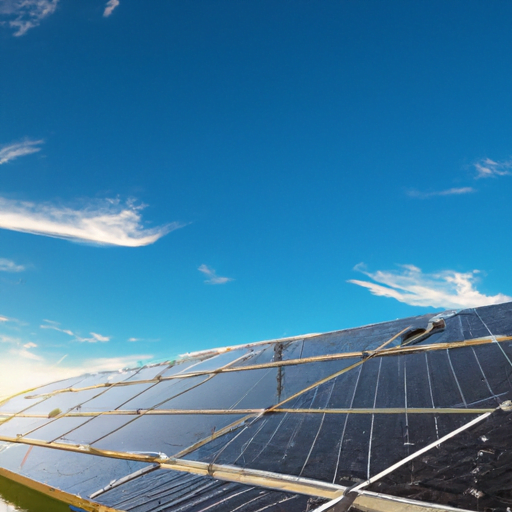Have you ever considered living off the grid? You know, being completely self-sufficient and relying on renewable energy sources like solar power? It’s a fascinating lifestyle choice, but there’s one thing about solar panels that you might not have thought about – the importance of keeping them clean. Yes, even though solar panels are designed to harness the sun’s energy, they still need regular cleaning to function optimally.
So, do solar panels really need cleaning? The short answer is yes, they do. Over time, dirt, dust, leaves, bird droppings, and other debris can accumulate on the surface of your solar panels, reducing their efficiency. Just like your car’s windshield needs cleaning to ensure clear visibility, your solar panels need to be kept clean to maximize their ability to absorb sunlight. Cleaner solar panels produce more electricity, which is important if you’re trying to generate enough power to meet your needs and possibly sell back any excess to the grid.
But how often do you need to clean your solar panels? Well, that depends on several factors. If you live in an area with heavy pollution, frequent rainstorms, or surrounded by dusty fields, then you may need to clean your solar panels more often. On the other hand, if you live in an area with relatively clean air and regular rainfall, then your panels might require less frequent cleaning. In any case, it’s a good idea to inspect your solar panels at least once a month and clean them whenever you notice a significant amount of dirt or debris. Cleaning can be as simple as spraying them with water or using a soft brush to gently remove any stubborn grime.
In conclusion, if you’re considering going off the grid and investing in solar panels, don’t forget about the importance of keeping them clean. Regular cleaning will help maintain their efficiency and ensure that you maximize your energy generation. Make sure to check out our article for more in-depth tips and tricks on how to properly clean your solar panels for optimal performance. So, are you ready to keep your solar panels shining bright and generating clean, renewable energy?
The Importance of Cleaning Solar Panels
Living off the grid has become increasingly popular as people strive to reduce their carbon footprint and become more self-sufficient. Solar panels are a key component of this sustainable lifestyle and can provide a reliable and renewable source of energy. However, many off-grid enthusiasts may overlook the importance of regularly cleaning their solar panels. In this article, we will explore the benefits of clean solar panels, the factors that can affect their efficiency, methods for cleaning, precautions to take, and the advantages of regular maintenance.
Benefits of Clean Solar Panels
Enhanced Performance
One of the primary benefits of cleaning solar panels is enhanced performance. When solar panels are covered in dirt, dust, or other debris, they are not able to efficiently convert sunlight into electricity. These obstructions can block the sunlight from reaching the photovoltaic cells, reducing the overall energy output. By regularly cleaning your solar panels, you can ensure that they are operating at their maximum potential and generating the most electricity possible.
Optimized Energy Output
Clean solar panels can also lead to optimized energy output. As mentioned earlier, dirt and debris can block the sunlight from reaching the photovoltaic cells. When the panels are clean, they are able to capture more sunlight, resulting in increased energy production. This is especially important during peak sunlight hours when the panels have the potential to generate the most electricity.
Improved Longevity
Proper maintenance, including regular cleaning, can significantly extend the lifespan of your solar panels. Dust, debris, bird droppings, and mineral deposits can accumulate on the surface of the panels over time, causing damage and reducing their efficiency. By removing these contaminants, you can prevent potential corrosion or permanent damage to the panels. Regular cleaning can also help identify any issues or damage that may require professional attention, saving you time and money in the long run.

Factors Affecting Solar Panel Efficiency
Now that we understand the importance of clean solar panels, let’s explore the factors that can affect their efficiency.
Dust and Debris Accumulation
Dust and debris, such as leaves, pollen, and dirt, can accumulate on the surface of solar panels over time. These contaminants create a barrier that prevents sunlight from reaching the cells, reducing their ability to generate electricity. Dust and debris accumulation can be especially problematic in areas with dry or windy climates, as well as near construction sites or agricultural fields.
Bird Droppings and Pollen
Bird droppings and pollen are another common issue that can impact the efficiency of solar panels. Not only do they create a physical barrier, but they can also contain corrosive substances that can damage the panels over time. Regular cleaning can help prevent bird droppings and pollen from accumulating and ensure optimal performance.
Mineral Deposits
Mineral deposits, such as calcium and magnesium, can also affect solar panel efficiency. These deposits can occur when water evaporates, leaving behind mineral residue on the surface of the panels. Over time, these deposits can build up and reduce the amount of sunlight that can penetrate the cells. Regular cleaning can prevent the formation of mineral deposits and maintain the panels’ efficiency.
Methods for Cleaning Solar Panels
Now that we understand the factors that can affect solar panel efficiency, let’s explore the different methods for cleaning them.
Manual Cleaning
Manual cleaning involves physically removing dirt, dust, and other debris from the surface of solar panels. This can be done using a soft brush or sponge and a mild soap solution. It is important to avoid using abrasive materials or harsh chemicals, as these can damage the panels. Manual cleaning should be done with caution and proper safety measures, especially when accessing panels installed on rooftops or at high elevations.
Automated Cleaning Systems
Automated cleaning systems are an alternative method for cleaning solar panels, particularly for large-scale installations. These systems utilize brushes, squeegees, or sprayers to remove dirt and debris from the panels. Some automated systems operate on a predetermined schedule or can be controlled remotely, making them an efficient and convenient option.
Waterless Cleaning Solutions
Waterless cleaning solutions, also known as dry cleaning methods, are becoming increasingly popular due to their convenience and environmental benefits. These solutions typically involve using microfiber cloths or special cleaning pads to gently wipe away dirt and dust from the panels. Waterless cleaning solutions can be a practical option for areas where water scarcity or restrictions are a concern.

Precautions for Cleaning Solar Panels
While cleaning solar panels is important, it is equally important to take precautions to ensure safety and prevent damage to the panels.
Safer Access and Proper Equipment
When cleaning solar panels, safety should always be a top priority. If your panels are installed on the roof or at a height, it is recommended to hire a professional to perform the cleaning. They have the necessary equipment, training, and experience to safely access the panels and perform the cleaning process.
Avoiding Abrasive Cleaning Materials
As mentioned earlier, it is crucial to avoid using abrasive materials or harsh chemicals when cleaning solar panels. These can scratch or damage the surface of the panels, reducing their efficiency and longevity. Stick to mild soap solutions, microfiber cloths, or other cleaning products specifically designed for use on solar panels.
Preventing Damage to Panels
When cleaning solar panels, it’s important to avoid putting excessive pressure on the surface, as this can potentially damage the panels. Use gentle, sweeping motions and refrain from using sharp objects or abrasive materials. Additionally, do not attempt to clean panels that are cracked or damaged. In such cases, it is best to contact a professional for assistance.
Frequency of Cleaning Solar Panels
The frequency of cleaning your solar panels depends on a variety of factors, including the climate, environmental conditions, and overall performance of the panels.
Monitoring Panel Performance
Regular monitoring of your solar panel system’s performance can help determine when cleaning is necessary. If you notice a significant decrease in energy production or a drop in efficiency, it may be an indication that your panels require cleaning. Keeping a record of your system’s performance will help you establish a cleaning schedule that aligns with your specific needs.
Weather and Environmental Factors
The weather and environmental conditions in your area can also affect how often you need to clean your solar panels. For instance, areas with high levels of rainfall may require less frequent cleaning, as rainwater can naturally wash away dirt and debris. On the other hand, areas with dry or dusty climates may require more frequent cleaning to ensure optimal performance.
Professional Cleaning Recommendations
Consulting with professionals in the solar industry can provide valuable insights and recommendations regarding the ideal cleaning frequency for your panels. They can assess your specific circumstances and provide guidance on how often to clean your solar panels to maximize their efficiency and longevity.
Effects of Dirty Solar Panels
Now that we understand the importance of cleaning solar panels and the factors that can affect their efficiency, let’s explore the potential consequences of neglecting their maintenance.
Energy Output Reduction
Dirty solar panels can significantly reduce the energy output of your system. As previously mentioned, obstructions like dust, debris, or mineral deposits prevent sunlight from reaching the photovoltaic cells, resulting in reduced electricity production. This can lead to a decrease in the amount of energy available for use, potentially impacting your off-grid lifestyle and requiring alternative energy sources.
Increase in Maintenance Costs
Neglecting the maintenance of your solar panels can lead to an increase in maintenance costs over time. Dirty panels are more prone to damage, such as corrosion, which may require costly repairs or even panel replacement. By regularly cleaning your solar panels, you can mitigate the risk of damage and potentially save on maintenance expenses.
Risk of Panel Damage
Excessive dirt or debris accumulation can cause physical damage to your solar panels. For instance, if bird droppings are left unaddressed, they can corrode the panel’s surface, compromising its efficiency and longevity. By regularly cleaning your panels, you can minimize the risk of damage and ensure their optimal performance.
Advantages of Regular Maintenance
Regular maintenance, including cleaning, can provide various advantages for your solar panel system.
Maximized Energy Production
By regularly cleaning your solar panels, you can maximize their energy production potential. Clean panels allow for better sunlight penetration, which translates into increased electricity generation. This surplus energy can be stored for later use or even sold back to the grid, maximizing the return on your renewable energy investment.
Reduced Energy Losses
Dirty or obstructed solar panels can result in energy losses, as the cells cannot efficiently convert sunlight into electricity. By keeping your panels clean, you can prevent energy losses and ensure that your system is operating at its highest efficiency.
Enhanced Return on Investment
Regular maintenance, including cleaning, can significantly enhance the return on investment (ROI) of your solar panel system. Cleaner panels generate more electricity, resulting in higher energy savings or potential revenue from selling excess power back to the grid. Additionally, by extending the lifespan of your panels through proper maintenance, you can delay the need for costly replacements and increase your overall ROI.
Environmentally-Friendly Cleaning Practices
In addition to maintaining optimal performance and saving on maintenance costs, it is essential to adopt environmentally-friendly cleaning practices when cleaning solar panels.
Water Conservation Methods
Water scarcity is a global concern, and it is important to conserve water whenever possible. When cleaning solar panels, consider using water-efficient methods, such as waterless cleaning solutions or collecting and reusing rainwater. This reduces your overall water footprint and promotes a more sustainable approach to maintaining your renewable energy system.
Eco-Friendly Cleaning Products
Choose cleaning products that are environmentally friendly and safe for use around your solar panels. Avoid harsh chemicals or solvents that can harm the panels or negatively impact the surrounding ecosystem. Look for eco-friendly cleaning solutions that are specifically formulated for solar panels and have minimal environmental impact.
Minimizing Chemical Runoff
When cleaning your solar panels, be mindful of potential chemical runoff. To prevent contamination of nearby water sources or plants, ensure that any cleaning products or runoff are properly contained and disposed of. Consider using biodegradable cleaning products and minimizing the use of chemicals whenever possible.
Common Cleaning Mistakes to Avoid
While cleaning your solar panels is essential, it is important to avoid common cleaning mistakes that can potentially damage the panels or reduce their efficiency.
Using Harsh Cleaning Solutions
Using harsh cleaning solutions or abrasive materials can scratch or damage the surface of your solar panels. Avoid using ammonia-based cleaners, bleach, or abrasive cleaning tools. Stick to mild soap solutions or specialized solar panel cleaning products to ensure the longevity and optimal performance of your panels.
Incorrect Cleaning Techniques
Using incorrect cleaning techniques can also cause damage to your panels. Avoid applying excessive pressure or scrubbing the surface too vigorously, as this can scratch or crack the panels. Follow the manufacturer’s instructions or consult with a professional to ensure you are using the correct cleaning techniques for your specific panels.
Neglecting Regular Maintenance
Neglecting regular maintenance, including cleaning, can lead to reduced efficiency and potential damage to your solar panels. Make cleaning and maintenance a regular part of your off-grid routine to ensure your system is consistently operating at its best. By doing so, you can maximize the lifespan of your panels and optimize your renewable energy production.
Conclusion
Regular cleaning and maintenance of solar panels is essential to ensure optimized energy production, increased longevity, and reduced maintenance costs. By adopting environmentally-friendly cleaning practices and avoiding common cleaning mistakes, solar panel owners can maximize their return on investment and contribute to a greener future. Take the time to clean your solar panels regularly, monitor their performance, and consult with professionals for guidance. By doing so, you can enjoy the full benefits of your off-grid lifestyle while making a positive impact on the environment.





